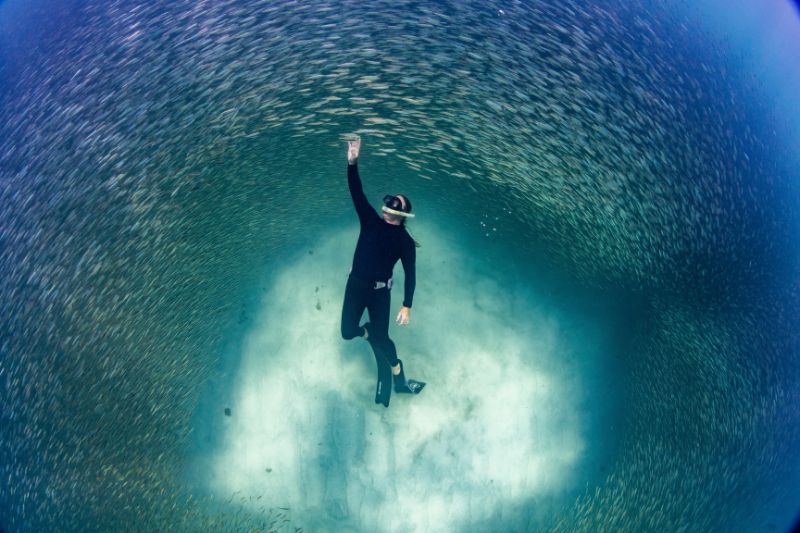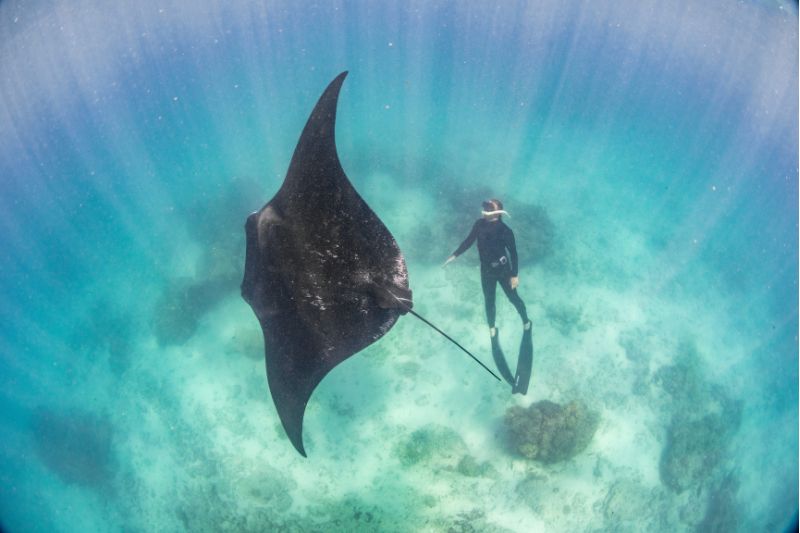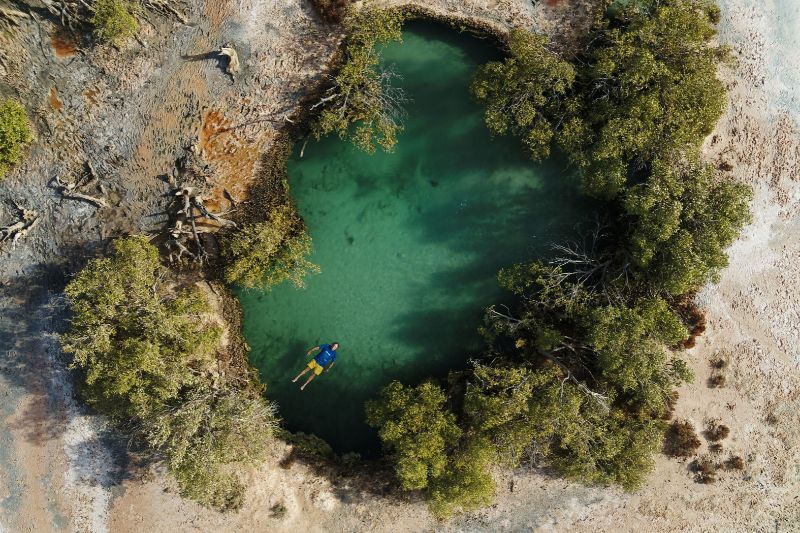Arguably Australia's most celebrated novelist, the name Tim Winton conjures up images of ocean surf and wild remote beaches. Winton has spent decades exploring the mysteries of the natural world in the pages of his novels and has become a leading voice in the conservation movement, particularly around Ningaloo in WA. Now with the release of his three-part documentary Ningaloo Nyinggulu on ABC, Winton invites readers to explore the remote parts of the country that have inspired his work. In an exclusive interview with Eureka Street’s David Halliday, the novelist behind Cloudstreet, Dirt Music and Breath discusses conservation, mystical encounters, and why we need to rethink our relationship to the wild.
Ningaloo Nyinggulu, written, narrated and executive produced by Tim Winton, screens on ABC TV and ABC iView from 16 May 2023.
DH: As Australia’s most beloved author, your name conjures up images of ocean surf and wild, remote beaches. Your love of rural Australia — the people, the wildlife, the water and the land — has resonated through your work and through audiences for four decades. You said Ningaloo is a place that ‘exhilarates you like no other’. Readers may know your conservation work there twenty-odd years ago. How much is Ningaloo Nyinggulu an invitation extended to your readers into a place that has been ever present in your work?
TW: Well, I guess you’ve hit it on the head. It is an invitation as well as a kind of celebration, a glorying in the wonders and miracles of this place, one of the last pieces of God’s body — as Hildegarde von Bingen called creation — that’s still intact enough to be itself. But it was also an inquiry and an adventure, an excuse for me to learn more about a place that’s given me so much joy and so many moments of grace. Having said that, it was a labour of love. Lots of love, but an enormous amount of work. To be honest, I thought, at times, that it might break me. We made it during the Covid lockdowns. We shot for 55 weeks in tough conditions. Nothing was easy. I’m glad to have had the opportunity, but I’m relieved to have survived it.
Writing a novel is a solo operation. Writing a documentary involves other people, more moving parts. What was the appeal for you in writing this documentary series as opposed to cherishing this same country in a novel?

Well, I did it out of a sense of duty. I felt I had to. It’s not something I’d have embarked upon without prompting. Not just because I’m a lone wolf and film production is a team sport, but also because I honestly didn’t know what I was doing. It was really daunting. I’ve never written natural history for TV. It’s a very specialised form of writing. You have to condense science into tiny, coherent bits of language. And in my case, because of my instincts, try to make those little gobbets of language beautiful. Because I didn’t want to accept some kind of safe, bland formula. So, it was quite a reach for me, accepting the challenge and submitting to the constraints. Not to mention negotiating the committee element at the heart of TV production, which was something of a culture shock. But I felt I had to step up for the sake of the place itself. I guess I’d call it an expression of patriotism. True patriotism is the honouring and defence of home and family — the soil beneath your feet, the air you breathe, the water you drink and swim in. True patriots need not wear khaki and carry a gun. Defending territory is one thing. Defending country is another.
I was in Busselton a couple of years ago, and my wife and I went out on a little boat to see humpback whales. Three of these giant creatures played around the boat for ages. One came right up and sprayed water all over us. I remember the taste and smell, the sensation of breathing in whale breath. Fishy, salty and completely surreal; an almost mystical encounter. You do the same in Exmouth Gulf with a pod of humpback whales and this series is peppered with moments like that. How much is Ningaloo Nyinggulu a gentle reminder about the other creatures we share the planet with? And in the Anthropocene, creatures we are arguably responsible for?

Yeah, moments like those are pretty special. Being anointed by the breath of a giant. It’s a moment of grace. But it’s worth remembering it’s a political outcome. Thirty years ago, it would probably not have been possible. Whales are back in numbers, blowing our minds and filling our hearts because a generation ago, activists lit a fire in the community and applied it to the feet of our political leaders. This is love in action, hope made real by folks taking collective action for the common good. We are responsible for the Anthropocene and responsible to creation, which is our gift and our home. Yes, in the series there are lots of encounters like this that remind us of these marvels and gifts; but also of our responsibility and the opportunity to honour and protect them and the ecosystems that produce them. An ecosystem is a locus of creativity, a reminder of the divine impulse.
Similarly, you pick off parasites from a whale shark’s mouth. That’s a strange thing. You’ve previously written about the communion between people and sea creatures — Blueback comes to mind. What was that whale shark encounter like? And what do you learn about the world, sharing the water with a creature like that? Preening a creature like that?
It’s a pretty rare thing to be able to do. More folks have been in space, or even stood on the moon than have had the opportunity to do something like that. Normally, it’s illegal to make contact with megafauna. But I was with a group of scientists (under special scientific permit, DBCA & AIMS protocols) who need to stop these sharks in the water in order to study them, take biopsies and ultrasound their organs. It turns out that if you pick tiny copepods off their lips, they slow down and then go vertical in the water and just stop. It’s a massive animal, and for a while you’re being pushed backwards through the water by it until it backs off the revs a bit, gets interested, and then goes into a bit of a state. As I say in the show, it’s like hanging off the front of a moving bus. And that mouth is a very big hole. It seems to sense that you’re a pretty inept swimmer, but a very passible cleaner fish. Big animals are curious. They learn. And up that close, they feel like relatives — neighbours at the very least. I’ve been very lucky to have encounters like these over many years. They force a bit of humility on you.
This series shows viewers strange and beautiful places and the creatures that live there. To conserve this area, you could have just as easily penned an argumentative piece, or written lengthy tracts of advocacy about why we need to shift our attitudes about consumption and conservation. Instead, you’re showing us beautiful things. There’s an element of ‘letting your life be your witness’ here. Ours is an age where activism is loud and often reduced to a retweet or repost. As activism, how counter-cultural is this?
Well, I’ve written polemical pieces and long pieces of advocacy and seen some of them move the dial, so I’m not one to write off essays and town hall speeches. And I’ve spent decades in activism, which sometimes needs to be loud, if not militant and unruly. I think there are as many ways to take action as can be imagined. I guess some of those do involve retweeting or reposting, to be fair. But action is largely physical and social, collective, and organised. When it’s disciplined and strategic, it produces change and lasting outcomes. But there’s something to be said for the power of beauty and wonder, awe and inspiration. Activism can’t just be leading people away from something. It’s also leading them to something. And for me, that thing is the miracle and gift of life and this unlikely world we’re gifted. I’ll use every tool at my disposal. But I wasn’t interested in making the kind of nature porn that lulls the viewer into false comfort and cheap consolation.
In the pages of your books there’s an undercurrent of big-hearted joy towards the environment as much as there is compassion for the characters. In a time when we do see a lot of climate anxiety (and fair enough), what’s the role of joy in conservation?
First thing to say is that the anxiety is warranted. Anxiety and rage are the only logical responses to the emergency that’s now upon us because of the nihilistic greed and immorality of corporations and governments. Anyone who blames ‘woke’ thinking for our young people’s anxiety is also likely to blame the poor for their anguish.
Pope Francis shared a similar idea about every person’s need for an ‘ecological conversion’, encouraging people to move towards a greater love for creation.
 On this matter, I’m with the Pope. An ecological conversion involves relinquishing pride; it requires a certain form of repentance and reconciliation. Also, an opening up of the spirit — personally, communally, institutionally and politically — to creation. We’ve lived too long in a state of alienation. It’s defiling our earth, the work of the Divine. That’s not just a form of blasphemy — it’s an act of self-destruction. These are grievous sins. The good news is that when we open ourselves to love and to joy, when we make ourselves humble enough, and vulnerable enough, to let these gifts register, we’re renewed and able to bear one another up. Life is full of anguish, but the world is a reservoir of healing. That’s my feeling, anyway.
On this matter, I’m with the Pope. An ecological conversion involves relinquishing pride; it requires a certain form of repentance and reconciliation. Also, an opening up of the spirit — personally, communally, institutionally and politically — to creation. We’ve lived too long in a state of alienation. It’s defiling our earth, the work of the Divine. That’s not just a form of blasphemy — it’s an act of self-destruction. These are grievous sins. The good news is that when we open ourselves to love and to joy, when we make ourselves humble enough, and vulnerable enough, to let these gifts register, we’re renewed and able to bear one another up. Life is full of anguish, but the world is a reservoir of healing. That’s my feeling, anyway.
Ningaloo is a place of contradictions. Where the desert meets the sea, where the tropics overlap the temperate zone, a place where rain arrives from opposite directions. The contradictions and connections of Ningaloo seem central to its unique character. How do you approach writing about environments that are at once beautiful and inhospitable?
Yeah, it’s interesting. It looks inhospitable and feels it sometimes. And then you’re reminded that people have lived there almost 60,000 years. And the archaeological record shows they lived very well. Well enough for them to have leisure, art, complex laws and ideas about the cosmos. Ningaloo is home to the oldest piece of symbolic ornamentation on the continent. It’s been good to humans for a long time. Tens of thousands of years before the sandal and the toga showed up, even while Neanderthals were still in Europe, humans like us were living rich lives at Ningaloo. I’ve always been drawn to places and people that aren’t what they seem. In that sense, Ningaloo delivers in spades. I think you just need to stop long enough to see and hear and smell and taste and feel what’s in front of you. Same applies anywhere, really. We’re addicted to surfaces. But some surfaces are armour, others are camouflage. Some things are little more than surfaces. But lots of those are moving, morphing, changing. Nothing is fixed. Except for a few unhelpful ideas.
We’re a nation of city dwellers. There’s a lot of people who have limited or no experience of a truly wild place, free from human interventions. Yet your novels are populated with characters — characters who have experienced pain and trauma, and often have these complex family dynamics — who also have this solitary and almost mystical appreciation of the non-human world. How do you approach this almost spiritual side to the relationship between humans and the natural world in your work? Where wild places can simultaneously and paradoxically be seen as home?
I think we are living, many of us in the developed world, a life that’s denatured to a degree unknown to human history before. As a result, whole cultures have begun to lose skills and insights they once had — including spiritual insights. The Enlightenment was a burst of light and promise in many ways. But it’s left a legacy of mechanistic, instrumental thinking that’s left us impoverished in many ways and blind in others. I think many of my characters feel an instinctive, often inchoate mystical connection to the non-human world — which is, after all, the natural world to which we belong and upon which we depend. Yes, it’s our home — and our only home. But there’s a long human history of defiling home, betraying family. St Paul says that creation was subject to vanity, that it cries out in travail; as those we traduce and overlook cry out in anguish. I think most of us yearn for connection to wild places and creatures, as we yearn for connection to others of our own species. We’re not meant to be denatured in this way. It’s not good for our souls or our bodies.
You said: ‘The best our world has to offer is the stuff we cannot make ... There are now more captive animals alive on our planet than wild creatures, and more modified landscapes than wild ecosystems.’ I saw this series as being not just about Ningaloo but about all our wild places. If this series is a call for a course-correct, how do we need to rethink our relationship to the wild?
Yeah, that’s fair. It’s about giving ourselves a reset. Asking ourselves, ‘Is the way we live and the stuff we expect and the way we do business adding to life, enlarging life, honouring the gifts and opportunities that come with being here on this planet?’ This is a turning point in human history. In the next decade, we have an opportunity to show what we are, as custodians of this gift. We’ve painted ourselves into a corner. Left it almost too late. Business as usual will cause the immiseration of our children’s children. It’s a familiar story. It could be from the Old Testament. We have the opportunity to show our wisdom, our love, our genius, our character. Our fealty. That’s called agency. I’m hoping we’ll turn from our folly, take the hard narrow road — in a hurry — and earn our place in God’s creation, which is a very big and undervalued chunk of our salvation.
Tim Winton, thank you for taking the time here.
Not at all! Thanks for your interest.
Ningaloo Nyinggulu, written, narrated and executive produced by Tim Winton, screens on ABC TV and ABC iView from 16 May 2023.
David Halliday is editor of Eureka Street.
Main images: (Top to bottom) Tim Winton swimming with school of fish at Coral Bay (Violeta J Brosig), Tim Winton swimming with manta ray at Coral Bay (Violeta J Brosig), Tim Wintin floating on Lake McLeod (Artemis Media).